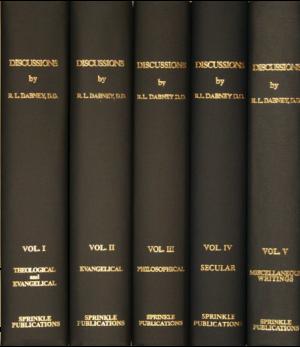
The great Southern Presbyterian theologian Robert Lewis Dabney has been mentioned a number of times on this site. It is a very telling indication of our times that such a visionary man is so little known, and usually slandered when mentioned at all. You can find the entire collection of his written works at the Dabney Archive, all of which are well worth reading. However, such a massive undertaking can be a bit overwhelming, and so on Sundays I have begun posting bite-sized excerpts from Dabney’s works with perhaps a little bit of my own commentary. This will be done in hopes of promoting wider readership for this great man. You can find links to all the previous “Dabney on Sunday” posts at the bottom of this post.
The following excerpt is taken from an article Dabney wrote for the New York Independent, entitled “Nature Cannot Revolutionize Nature.”
These attempts to do the impossible illustrate the most absurd enterprise of all: the attempt of our modern materialistic infidels to abolish religion. The Commune shouted, “Down with property and religion, the two chief enemies of human progress.” The only result of success in destroying religion would be to replace it with some mischievous superstition. This is sufficiently evinced, to any sober mind, by a review of the past. Every people, in every age, has had either its religion or its superstition; either its God or its Fetich. Now, a universal result is an index of a permanent cause: there must be something in human nature which compels it to recognize the supernatural. When our would-be philosophers assume that they can exist without this necessity, it is only the very modest pretension that they are themselves supernatural; that is, more than men. That religion is inevitable to man may be inferred again from the uniform result of every attempt which has been made to exclude, or even to omit it from human thought and life. They have always been predestined failures. Thus, those who profess to understand the system of Confucius, nominally so dominant in China, tell us that it is not really a religion, but a social system of morals; that it offers the Chinese mind no object of divine homage save an abstraction; and that it is in fact only a system of moral rules enforcing the idea of civic subordination; the only worship inculcated, that of dead ancestors, being designed merely to strengthen the impulse of filial respect. What now, is the result? There is no people who make a more frequent recognition of the supernatural. To say nothing of the vast system of Buddhism, the whole nation seems enslaved to demon worship, and to the bondage of “the evil eye,” “the influence,” and the genii of localities. Yet the Chinese are at once the most astute and the most materialistic of the Oriental races.
But we may come nearer home. The materialist Thomas Hobbes, of Mahnesbury, was said to be more afraid of ghosts than any educated man in England. Atheistic French Democracy professed to abrogate God, the Church, and the Sabbath; but so strong was the religious necessity, that even these madmen enthroned the “Goddess of Reason.” Auguste Comte spent his life in teaching that his “Positive Philosophy” necessarily excluded every supernatural notion. But at its close he finished by establishing a new religion, and a proposed hierarchy with Comte as its hierophant, and the soul of his deceased mistress as a sort of “Queen of Heaven.”
These facts may be set in a light still more mortifying to the enemies of Christianity, and more conclusive against their hopes. The weakest religions have always been strong enough to out-vie infidelity upon a fair trial. What has it then to hope, in the presence of a true Christianity, with its purity and power? Even popery, the fruitful mother of infidels, has Saturnian strength enough to devour these, her own children. French popery begot Voltaire; and so sorry a religion as French popery was adequate to overthrow Voltaireism. We are told that the effect of national misfortune and humiliation has been to fill the Romish Church again with Frenchmen (and not women only), and to precipitate the people into sham miracles, the pilgrimages, and the other fooleries of the Middle Ages. The Augustan age of classic paganism gave a similar result. Greek and Roman philosophy deemed itself too wise to retain the old traditionary creed of their fathers. They could laugh at the auspices, and explode Pan and Ceres, Castor and Pollux, with the herd of imaginary gods. But none the less must the Augustan age have gods from some whither; so philosophic Athens had its altar to “The Unknown God,” and imperial Rome imported Judaism, the mystery of the Egyptian Iris, and the magic of the East. Now, gentlemen infidels, we may heartily concur with you in your scurvy estimate of these ancient and modern paganisms, the religions of Jupiter and the Pope. But we remind you, that scurvy as they were, they were sufficient to conquer you. “If these things were done in the green tree, what shall be done in the dry?” If mankind is compelled by the constitution of the soul, in ages when it seemed to have no better choice than between these wretched creeds and you, to prefer either of these to you; what are your prospects against the universal diffusion of the Christian religion, with its ennobling and satisfying truths?
Previous Dabney on Sundays:
Universal Suffrage
Abstractions
Redefining Terms
False Philosophies
| Tweet |
|
|
|




